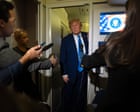Discussing the dilemma facing western diplomats in confronting Iran’s nuclear programme, Henry Kissinger wrote in 2006: “Diplomacy never operates in a vacuum. It persuades not by the eloquence of its practitioners but by assembling a balance of incentives and risks.”
Rarely has the balance of incentives and risks been placed so starkly in front of Iran’s leaders as now.
Donald Trump, either by design or by stumbling ad hoc towards a strategy, has left Iran with a stark choice: either return to the negotiating table and accept the offer of “a deal”, or see Israel – possibly with US support – pulp Iran’s security apparatus, nuclear programme and economy into the ground in what would be the ultimate exercise in maximum pressure, the term the US president gave to his first-term economic sanctions against Tehran.
Judging by his statements and actions over the past 48 hours, Trump is also trying to demonstrate that any deal is seen to be on his terms, and that he is sole decision-maker. It is an attempted display of raw power not just to Iran, but toEurope.
In a move designed to underline Europe’s irrelevance and indeed his contempt for the multilateralism symbolised by theG7, Trump abandoned the Canadian summit a day early. He has left such G7s early before, but never quite so dramatically.
One senior diplomat, asked if Trump had flown to Washington essentially on a diplomatic mission to secure peace or to join the war against Iran, replied frankly: “We don’t know!”
As Air Force One departed,Emmanuel Macron tried to shape narrativeof the departure by saying that a ceasefire was in the offing, if not close. Trump then, in a tone of some relish, belittled the “the publicity-seeking” French leader in typically stark terms. “Whether purposely or not, Emmanuel always gets it wrong,” he posted on Truth Social. He was after something “much bigger” than a ceasefire, he said.
Indeed US diplomats at the G7 had refused to countenance the call for a ceasefire appearing in the joint communique on the Iran-Israel crisis, the chief raison d’être for issuing a joint statement in the first place.
In the interests of securing any kind of communique, the European leaders retreated, leaving a sparse eight sentences that in effect implicitly endorsed Israel’s actions by saying we “affirm that Israel has a right to defend itself. We reiterate our support for the security of Israel.”
The four European leaders left abandoned high in the Rocky Mountains with the Japanese prime minister, Shigeru Ishiba, and other international leaders invited by their host now have to reassemble for the second day of the summit without the US. Spare a thought for the Ukrainian president, Volodymyr Zelenskyy, and the Mexican president, Claudia Sheinbaum, with whom Trump had meetings scheduled at the G7 on Tuesday.
It looks once again as though Europe has been left as the bystander to history, adept at drafting consensual communiques and declarations while the decisions are made by unilateralists prepared to use destructive force. Rarely has the sword been so much mightier than the pen. Russia happily crowed it had always seen the G7, a club from which it was excluded for invading Crimea, as “pretty useless”.
In fairness to Europe’s leaders, they have tried to play a part in securing a deal. Three European foreign ministers spoke to their Iranian counterpart, Abbas Araghchi, by phone at the request of the US.
The kernel of the proposal that they relayed was that Iran should offer in effect an unconditional ceasefire, and end all talk of escalation. Threats by Tehran to remove all UN weapons inspectors needed to be rescinded. The idea of a motion to the Iranian parliament calling for Iran to leave the nuclear non-proliferation treaty, a precursor to acquiring a nuclear bomb, should be dropped. US assets in the region must not be attacked. De-escalation had to be the priority, since any escalation would lead to a catastrophic conflict, the consequences of which no one could control, as was said by the UK foreign secretary,David Lammy.
Araghchi, sources said, reverted to his argument that Iran could hardly silence the guns without Israel doing the same. The outcome of those discussions was then relayed to Marco Rubio, the US secretary of state, by Lammy and the French foreign minister, Jean-Noël Barrot.
One western diplomat admitted they were sending messages to the Iranians about a US-Israeli strategy about which they had not been consulted. Lammy had earlier hinted at his disagreements in the Commons, stressing the UK was not approving or involved in Israel’s military action.
Iran’s nuclear programme had to be constrained, he agreed, but “fundamentally, no military action can put an end to Iran’s nuclear capabilities”. It was for Iran to choose its leaders, he added.
Back inCanada, Macron also warned against enforced regime change. “Those who believe that bombing from the outside can save a country despite itself and against itself have always been wrong,” he said.
Now everything rests on what the US proposes. Speaking on Air Force One on the way to Washington, Trump said he wanted a“real end” with Iran “giving up entirely”on its nuclear programme. That on the surface means an end to Iran’s right to enrich uranium, Tehran’s red line since it touches on its sovereignty. But a diminished Iran will have to decide if, in the interest of self-preservation, it has to abandon any right to draw red lines. A chastened Europe after this past few days will probably recognise that dilemma.
